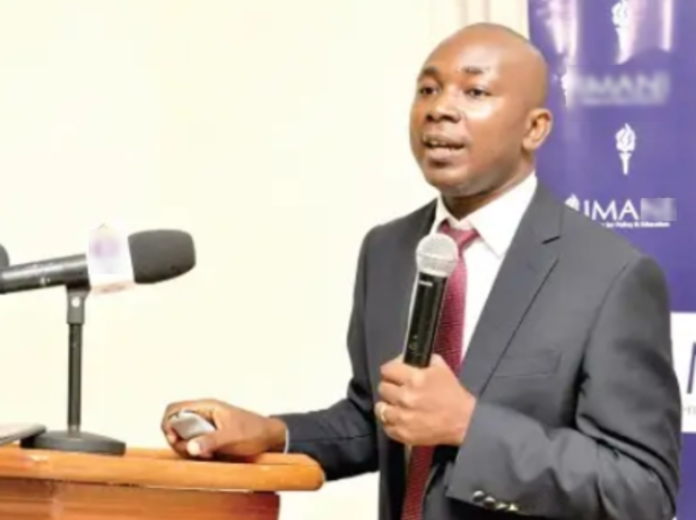Avoid New Bureaucracies for 24-Hour Economy Policy – Prof. Godfred Bokpin Warns Against Extra Costs
Professor Godfred Alufar Bokpin, a respected economist and Professor of Finance at the University of Ghana, has advised the government to resist the temptation to establish a new authority to oversee the implementation of the 24-hour economy policy. According to him, creating an entirely new administrative structure will not only introduce unnecessary bureaucracy but also inflate public spending without guaranteeing efficiency.
Speaking on JoyNews’ flagship program Newsfile on Saturday, July 5, Prof. Bokpin made a strong case against setting up a new governing body to manage the 24-hour economy initiative, which is designed to extend working hours in critical sectors of Ghana’s economy. Instead, he advocated for leveraging existing governmental structures and institutions to drive the policy effectively and cost-efficiently.
No Need for a New Authority: Use Existing Structures
“You don’t need to create an authority for the 24-hour economy,” Prof. Bokpin emphasized. “This is a government programme—everybody works with it.”
Drawing on Ghana’s historical approach to public policy implementation, Prof. Bokpin explained that one of the key failings has been the frequent detachment of new policy interventions from existing institutional frameworks. This detachment, according to him, is often driven more by political motives than practical needs, leading to inefficiencies and fragmentation.
“Since 1992, if you look at development policies and how we seek to implement them, we take them away from the existing structures within which development channels must flow. That is where the politics becomes typified,” he explained.
Citing Wasteful Public Spending in Existing Authorities
Prof. Bokpin highlighted the financial inefficiencies that have plagued several government-established agencies, using them as cautionary examples. He pointed specifically to the National Health Insurance Authority (NHIA), where a significant portion of allocated funds goes into administrative expenses rather than core operations.
“Pick NHIA from the time it was set up to date—approximately 44% of the total allocation to them is spent on administration. How do you pay claims promptly?” he asked rhetorically.
He also criticized the Ghana Cocoa Board (Cocobod) for excessive spending on non-essential assets. “Look at Cocobod—it is possible that Cocobod has more V8s than cocoa beans,” he added, illustrating the imbalance in resource allocation in some government agencies.
A Mindset Shift, Not More Bureaucracy
At the core of Prof. Bokpin’s argument is the notion that the success of the 24-hour economy should be driven by a shift in national mindset and operational culture, not by expanding the public sector.
“We don’t need to create a separate unit within the Ghana Police Service for a 24-hour economy. It is supposed to be a mindset,” he said.
In his view, the policy should be treated as a cross-sectoral government initiative that can be embedded within existing ministries, departments, and agencies (MDAs). This integrated approach, he argued, would ensure policy continuity and reduce the risk of abandonment in the event of a change in administration.
IMF Programmes as a Model for Efficient Implementation
To support his argument, Prof. Bokpin referred to Ghana’s successful track record of implementing 17 International Monetary Fund (IMF)-supported programmes without creating any separate secretariats.
“We have successfully implemented 17 IMF-supported programmes, and in all of these, we have never created a secretariat,” he noted. “The IMF has an office here—but it is not an implementing office.”
This, he said, proves that with proper planning, Ghana is capable of executing complex policy frameworks without ballooning the size of its bureaucracy.
Questions the Need for a New Data-Collecting Body
Another aspect of the proposed 24-hour economy implementation that Prof. Bokpin questioned was the creation of a new unit tasked with data collection. According to him, the mandate of the Ghana Statistical Service (GSS) already covers such responsibilities.
“If the document says there will be a secretariat that will collect data, what is Ghana Statistical Service doing?” he asked.
He urged the government to rely on the expertise and capabilities of the GSS, rather than duplicating functions that are already being performed by existing institutions.
Emphasizing Long-Term Sustainability Through Decentralisation
Prof. Bokpin further emphasized the importance of sustainability and continuity in public policy implementation. He proposed utilizing the already established decentralised local government system to operationalise the 24-hour economy policy.
“We have a decentralised local government system—let’s use it. That way, we will minimise the cost of implementing these interventions,” he advised.
He stressed that embedding the 24-hour economy policy within existing government systems would ensure continuity across political transitions and reduce disruptions that typically come with new administrations.
“Once we infuse it within the existing systems—ministries, departments, agencies—they are all running with it. Even if there is a change in government, it will not necessarily dislocate the pathway and the result,” he concluded.
Final Thoughts
Professor Godfred Bokpin’s insights offer a pragmatic and cost-conscious approach to implementing Ghana’s 24-hour economy policy. By advocating for the use of existing governmental structures and a shift in national operational mindset, he presents a sustainable model that aligns with fiscal discipline and institutional efficiency.
As Ghana seeks to transform its economy through extended working hours and enhanced productivity, policymakers would do well to heed calls like Prof. Bokpin’s—calls that prioritize long-term sustainability over short-term political gains and bureaucratic expansion.

